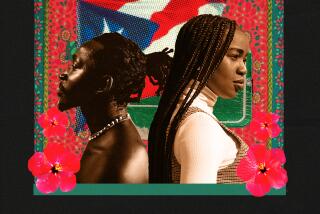Review: ‘Good Hair’ blends comedy and facts
- Share via
Hair -- short, long, curly, straight -- if it happens to be on a woman’s head, those tresses come with issues; roots buried deep in the complicated corner of the brain where self-esteem lives.
If it is “black” hair -- as in ethnic -- there are many more layers of issues and implications that Chris Rock tries to untangle in answering a question posed by his 5-year-old daughter a few years ago: Daddy, why don’t I have good hair?
The result is the documentary “Good Hair,” an amusing, poignant and surprisingly candid look at the topic with a disarming Rock coaxing answers and opinions from an eclectic cross section of African Americans, including Maya Angelou, Al Sharpton, actresses, models, stylists and everyday patrons of barber shops and beauty parlors around the country.
Not surprisingly, it is a story with money at its center -- the multibillion-dollar business of black hair from the processes used to straighten it, to the money spent to weave straight hair over it, to the cultural stigma attached to it.
Though Rock has a distinct point of view -- natural is better -- instead of outrage, he relies on irony and his own bemusement to walk us through a world he clearly finds troubling. Indeed, what carries this film is Rock, as both star and part of the writing team he has surrounded himself with old friends from “The Chris Rock Show”: writer-director Jeff Stilson and writers Chuck Sklar and Lance Crouther.
The result is a documentary that weaves as much comedy as fact into the narrative, making the experience a satisfying entertainment even for the lucky few who have no hair cares at all.
The story of “Good Hair,” Rock explains, begins in Atlanta, the hometown for so many things that define black culture. In this case it’s the Bronner Bros. International Hair Show, an annual convention on black hair that attracts more than 100,000 hairdressers and culminates with a styling face-off that is a comedian’s dream. It ends with the four top competitors staging styling extravaganzas complete with marching bands, dancers and remarkable feats of skill -- do you have any idea how hard it is to cut someone’s hair when you’re hanging upside down or underwater?
Black hair is a huge, global business, little of it in the hands of black business owners. Rock tracks down one of the few, the Greensboro, N.C.-based Dudley Products, which specializes in the chemical mixes used to “relax” hair. Relax turns out to be a good descriptor, because while hair may not be capable of anxiety issues, as Rock shows us, the heads underneath the hair certainly are.
The documentary uses comparison rather than condemnation to make its key points. Though the Dudley family is never grilled on the safety of their products, Rock interviews a scientist analyzing the ingredients found in typical straightening products. The demonstration shows they can eat through a soda can in a few hours. That’s followed by conversations with girls as young as 5 having their hair straightened. No, they don’t like the process, but they love the result. We can connect the dots.
From straightening he moves to weaves, which takes him to India, where the big money is. Here the hair is gathered from temples where the religious rite of tonsuring -- shaving off one’s hair and donating it to the gods -- takes place at the rate of roughly 10 million heads a year. He follows along as the hair is collected, cleaned, combed, stitched and readied for sale in the U.S. where weaves cost from $400 to $4,000 and need replacing every few months. For too many, the price of keeping good hair on their head is more than putting a roof over it.
Though Rock mines many laughs along the way, there is a sadness in watching young African American women discuss wanting the “good hair” that says smart, professional, sophisticated, upscale, educated.
The black hair that has launched a thousand discussions in recent months, Michelle Obama’s long straight locks, is noticeably absent from the discussion. In a sense, it underscores the very issue Rock is grappling to explain to his daughter, for the main question circling the first lady’s hair is not whether she should go natural but how in the world she manages to get that look.
More to Read
The biggest entertainment stories
Get our big stories about Hollywood, film, television, music, arts, culture and more right in your inbox as soon as they publish.
You may occasionally receive promotional content from the Los Angeles Times.











